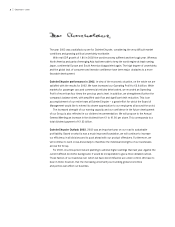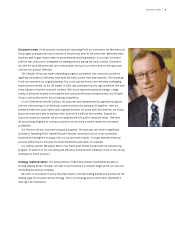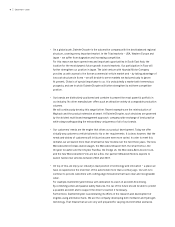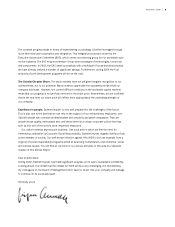Mercedes 2002 Annual Report Download - page 18
Download and view the complete annual report
Please find page 18 of the 2002 Mercedes annual report below. You can navigate through the pages in the report by either clicking on the pages listed below, or by using the keyword search tool below to find specific information within the annual report.
Slight recovery of global economy in 2003
Due to increasing economic and political uncertainty,
prospects for the world economy worsened after the
summer of 2002. Nevertheless, we assume that global
economic growth will recover towards the end of 2003
and in the following years. The preconditions for such an
improvement are a reasonably stable global political
framework and a return of confidence among investors
and consumers. The economies of the United States
and the European Union, including Germany, should
resume steady growth in the coming years, while Japan
is unlikely to overcome its prolonged recession soon.
We anticipate above-average growth rates for Asian
emerging markets and Eastern Europe, and from 2004
also for South America. Overall, we expect the world
economy to grow by 2.7% in 2003 and by about 3% in
2004 and 2005.
Furthermore, we assume that compared with the
average exchange rates for 2002, the euro will streng-
then moderately against the US dollar, the Japanese
yen and the British pound in the period from 2003 to
2005.
Continuation of difficult market conditions
Against this macroeconomic background, automotive
markets will probably improve only slowly. We anticipate
some decrease in overall demand in North America in
2003, even if car manufacturers continue to offer gener-
ous incentives in the United States. Nor do we expect
any significant recovery in the passenger car markets of
Western Europe and Japan this year.
Outlook
12 |Outlook
The same applies to international commercial-vehicle
markets, for which we do not see an uptrend in 2003
because of the macroeconomic background. In the
United States we expect a further significant decline in
demand for heavy trucks in the first half of 2003 due to
purchases brought forward in the prior year in anticipa-
tion of new emission requirements. From 2004 onwards
we expect unit sales of passenger cars and commercial
vehicles to increase again as a result of improvements
in the global economy.
Modest growth prospects for major automobile
markets, shorter product lifecycles and worldwide sur-
plus manufacturing capacity will further intensify
competition and put upward pressure on unit costs in all
market segments. In addition, stricter environmental
and safety regulations will require substantial expendi-
ture by all manufacturers. In this situation the im-
portance of brands and successful brand management
as a competitive advantage will increase (see page 42).
Customers’ increasingly specific demands, particularly
for niche products and segment-busting vehicles with
universal applications, should create growth opportuni-
ties which DaimlerChrysler will vigorously pursue.
Earnings improvements for DaimlerChrysler despite
difficult markets
DaimlerChrysler plans to achieve an increase in
earnings in the years 2003 through 2005, based on a
large number of attractive new models and the
successful implementation of programs for increasing
efficiency and competitiveness. Closer coordination
of our global activities and the resultant cost savings,
knowledge transfer within the Group, as well as the
cooperation with our Asian partners should generate
higher earnings. In particular, projects initiated by the
Executive Automotive Committee (EAC) will ensure
that the potential of cross-divisional cooperation is fully
exploited (see pages 42-43). A precondition for the
expected improvement in earnings, however, is that
conditions remain stable in our most important markets.
Growth in earnings expected despite difficult conditions |
Product offensive to bring further growth for Mercedes Car
Group |Chrysler Group to continue progress and to
boost competitiveness with new products |Commercial
Vehicles division: continued optimization of products and
production methods with more economies of scale |Further
expansion of automotive services |342 billion to secure
the future
























